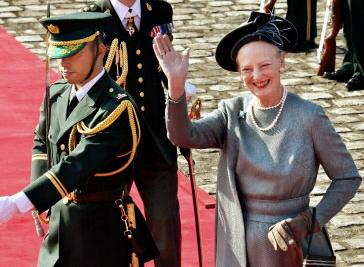If you look through a campus coffee-shop bulletin board, in all likelihood you will see notices for more than a dozen militant organizations with the word “peace” in their titles. Or try the internet — while googling up random lefty sites, you will find, for example, a list of local “activist” organizations in Austin Texas. On the progressiveaustin.org page are: Peace In Austin, Austin Center for Peace and Justice, Austin Dialog for Peace and Justice, Austin Peace and Justice Coalition, Austin Taxpayers for Peace, Buddhist Peace Fellowship, Dialog for Peace, Jewish Alliance for Justice and Peace, Peace Action Texas, Peace Works, South Austin Neighbors for Peace, Students United for Peace and Justice, Texans for Peace, and Veterans for Peace. If you relax the rules to include Latin synonyms, you could add Pax Christi.
This last name reminds us that religion is profoundly focused on peace: The peace of Christ, God’s peace, the peace that passeth understanding… Islam, of course, offers peace through submission to Allah.
Peace processes, peace feelers, peace negotiations, peacekeepers, peace monitors… What is this thing called “peace” that everyone seems so preoccupied with?
It is the opposite of “war”, of course. So between 1991 and 2003 Saddam Hussein’s subjects must have been experiencing “peace”. And all through the 1950s the citizens of the Soviet Union lived in “peace”.
In an April 17 post in The Word Unheard, USMC Vet referred to
| |
…the [Left’s] core belief that to acquiesce and avoid conflict at any cost is peace. |
This definition seems to be in accord with the “peace” that reigned in Saddam’s Iraq, or that flourishes now in North Korea.
It was not always thus. For most of human history, “peace” meant being able to plant your crops or herd your sheep without being set upon by marauders and murdered, with your last thought the knowledge that your wife and children were about to be carried off into slavery. It meant building a prosperous community in which people could follow their livelihoods without molestation. It meant being able to travel the roads without being beaten and robbed by brigands. It was greatly prized, and it was very rare.
In Europe during the Dark Ages, peace was attained by being the strongest bully in the neighborhood, or by paying tribute to be protected by him. It was tenuous at best, subject to constant testing by arms, and did not allow room for building what we call civilization.
But the office of strongman became hereditary, and peace was gradually enlarged to enclose more and more groups under his protection. The bands of warring brigands became groups of warring feudal states.
In England, the Magna Carta was signed by King John and his barons to bring order and stability to the relations among the different feudal entities. The barons gained recognition of their rights, the king gained security from rebellion, and the kingdom became more orderly. Notice that the word “peace” appears eight times in the text of the Magna Carta. Obviously the signatories considered peace to be indispensable for the advancement of their separate interests.
The concept of the King’s Peace first appeared during the reign of Richard I in 1195. Peace was henceforth to be seen as the responsibility of the king, and its breach required that the culpable parties be answerable to him. During the reign of Edward III in 1361, Justices of the Peace were appointed for the first time. The Crown, in effect, was claiming a monopoly on violence in the realm, and appointing officials to enforce it.
Through all the centuries that followed, through all the rebellions, insurrections, feuds, and civil wars, through the general brigandage, mayhem, and violence, the King’s Peace was the gold standard for affairs in the kingdom. Though honored more often in the breach than in the observance, it remained the ideal for the civic polity.
As the English-speaking diaspora spread throughout the world, the concept of peace was refined, extended, and more fully realized. The development of a legal system to which all had recourse, the establishment of local officers and then police forces, the creation of responsible and accountable local government — all these tended to enlarge the condition of peace.
Peace is not just when the war is over and the armies are demobilized. Peace is the condition of being secure in one’s property and person, of being able to perform one’s routine activities without fear of violence. The last century and a half has allowed us to forget how rare and precious real peace is. The typical condition of mankind before the nineteenth century was to live in brutality and fear. Men had to be armed and eternally vigilant to attain peace; slaves, serfs, and women could not hope for it without the protection of a rough man ready to do violence on their behalf.
There are still enclaves in America that lack peace — the inner city where gangs rule, for example — but the vast majority of citizens can live the vast majority of their lives in peace. A yeoman in fourteenth-century England would have been on his knees thanking God in unabashed amazement had he the opportunity to experience the peace which is our routine and unearned condition.
In the luxury of our current circumstances, the definition of “peace” that USMC Vet mentioned has evolved. To recap, “to acquiesce and avoid conflict at any cost is peace.” When the bullies, thugs, and brigands emerge to confront us, we are not to take up our cudgels against them. Remain supine before your persecutor, allow his boot to remain firmly on your neck, and then you will have peace. Rely on reason, on discourse and argumentation, to dissuade the assassin from his task. Understand his point of view; look at the historical reasons for his behavior; acknowledge your culpability in creating the conditions that produced him — why, you deserve what you’re getting, you know. Give him everything he wants, and what follows will be called “peace”.
When Saddam burned, gassed, shredded and mutilated his subjects by the hundreds of thousands, that was “peace”. When the United States overthrew him, imposed the rule of law, and arranged elections, that was not “peace”.
The crashing of airliners into the World Trade Center was not war. It was “peace”.
The peace that passes all understanding. Peace in our time.






